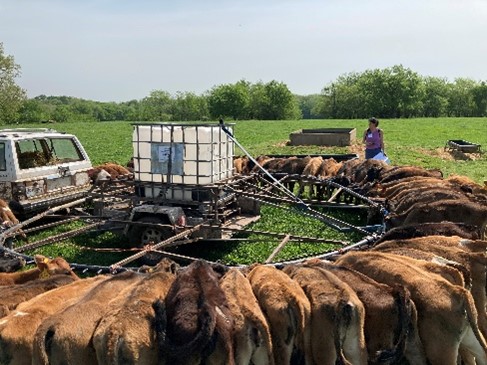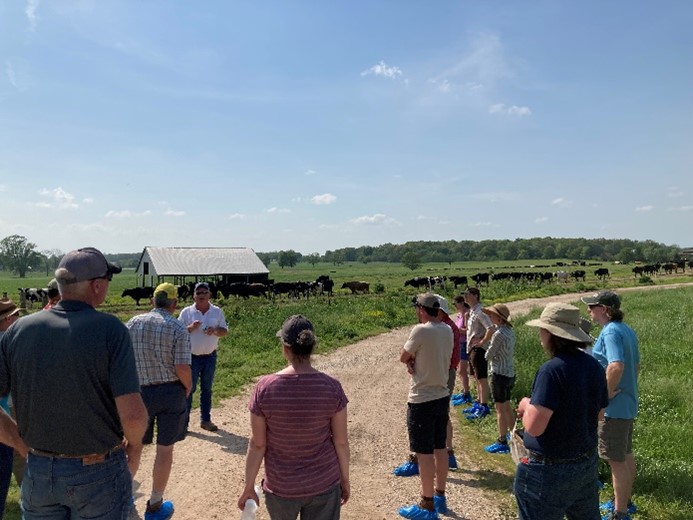Northeast Dairy Business Innovation Center (NE-DBIC) Hosts 20 on Missouri Grazing Dairy Learning Journey
By Laura Ginsburg, VT Agency of Agriculture, Food & Markets
The NE-DBIC, supported by University of Missouri Extension and Dairy Farmers of America (DFA), hosted an opportunity for northeastern farmers to learn from New Zealand and Irish dairy farmers in Missouri. The group of 20 was comprised of farmers, technical assistance providers, and Agency staff from four states. Farmers who attended represented the diversity of dairy production including organic, conventional, 100% grass fed, seasonal, and current Dairy Grazing Apprentices.
Missouri is home to a group of New Zealand and Irish owned farms who practice dairy as is common in their home countries - seasonal milking, intensive rotational grazing, and limiting the addition of supplemental feeds. While these farms tend to be larger than the average northeastern dairy and do not experience winter in the same way we do, there were many important lessons learned during the trip.
All of the farms raise their calves in group housing from the day of birth, and the group was interested to learn about these labor and time efficient management strategies. The first farm demonstrated feeding a group of 80 calves, who were between 2.5 and 3 months old, so that we could see the use of a 100-calf portable feeder. On other farms the group learned about forage and animal management in a rotational system, where cows are expected to walk upwards of ¾ of a mile each way. Farms generally divide their herd into groups based on body score, a practice that is done weekly and allows them to support first calf heifers and those cows who need to add more condition.
Of note, the group met farmers who have entered dairy via a variety of paths that are unconventional for US dairy, including contract milkers, sharemilkers, and farm managers. These different strategies allow young and beginning farmers to gain experience and equity with a clear pathway from being a farm hand to being a farm owner or partner without the cash outlay or loan typical of farm transfers.
In all, the group deemed this a successful trip. The NE-DBIC is planning a similar opportunity to a different location in 2023 for those who may be interested in attending.

Image 1 – 80 calves eat at a group feeder at Flooded Rock Dairy, operated by sharemilkers Matt and Taleah Johnson. Photo – Laura Ginsburg

Image 2 – Randy Mooney, chair of the DFA board, explains cow management as his herd of 300 walk in from pasture.
Technical Assistance for Transition to Grazing Cohorts
By Brockton Corbett, VT Agency of Agriculture, Food & Markets
The Northeast Dairy Business Innovation Center (NE-DBIC) has identified grass-based dairy farming as a significant market opportunity for farmers in the region. To support this work, the NE-DBIC has engaged with several service providers over the last few years. These service providers conduct technical assistance to farms interested in transitioning to grass-based production models, enhancing the production of home-grown forages, and/or utilizing alternative farm management strategies not typically found in the United States dairy sector.
The following list of projects are the most recent technical assistance providers who are servicing farms within the Northeast region.
Projects Underway:
Conservation Performance LLC |Northeast Region| is working with a panel of farmers and farm financial experts to build a set of financial reports that represent the implementation of a New Zealand-style farm structure adapted for use in the Northeast.
Cooperative Regions of Organic Producer Pools (CROPP) |ME, VT, NY, PA| will work with no less than 35 farmers in their area, to promote and educate on climate smart farming with an emphasis on practices that are most associated with profitability and environmental stewardship.
Cornell University Cooperative Extension will work with two cohorts in New York of 5-10 farmers each to collect data and perform independent studies on dairy replacements on organic dairies, healthcare preventions and remedies for organic dairy replacement, and the economic disparity caused by the loophole in the USDA’s Origin of Livestock Rule.
UMAINE Cooperative Extension |ME| will work with Maine dairy farmers to implement precision dairy technologies. Farmers will also utilize the data from wearables to enhance current management on their dairy farm to improve production, health, and cow comfort.
UVM Extension |VT, NY| will work in tandem with agronomists, animal nutritionists, grazing experts, and farm financial experts to work with 8-10 farms on developing a holistic alternative management strategy.
Assessment of Dairy Farms Interested in Supplying Milk to Local & Regional Specialty Cheesemakers: Final Report Now Available
By Brockton Corbett, VT Agency of Agriculture, Food & Markets
In Vermont, the dairy sector is responsible for $1.3 billion dollars coming into the state’s economy. Of this, cheese production makes up half of this total making it the largest and most dynamic portion of dairy related activity. This represents a significant opportunity for milk producers who are experiencing unsustainably low prices for fluid milk, since milk that meets standards for specialty cheeses can receive significantly more per hundredweight.
To understand this market opportunity better, the Northeast Dairy Business Innovation Center contracted with Karen Karp & Partners (KK&P) to conduct research. This research included a landscape assessment and interviews with four specialty cheesemakers and 17 milk producers from southern Vermont and Massachusetts. From this work, KK&P developed their report Assessment of Dairy Farms Interested in Supplying Milk to Local & Regional Specialty Cheesemakers. If you are interested in reading more into the report, please visit: https://agriculture.vermont.gov/form/report-milk-cheese-assessment-study

